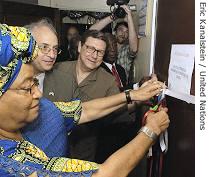2007年VOA标准英语-Liberia to Resume Diamond Trade(在线收听)
Dakar
02 May 2007
Liberia has announced it will again export diamonds, using the profits to finance reconstruction, instead of conflict, as was the case in the past. But experts caution that transparency is still crucially important, and diamond profits may not be the panacea Liberia hopes. Naomi Schwarz has the story from our regional bureau in Dakar, with additional reporting by Prince Collins in Liberia.
The Hollywood film Blood Diamond brought the issue of conflict diamonds to the big screen and renewed international attention.
But, in the meantime, in West Africa, where much of the illicit trade and bloody conflicts took place, governments and international bodies are working to ensure that the problem is in the past.
The latest development comes from Liberia, which suffered from a decades-long civil war. In 2001, the United Nations placed an embargo on diamonds coming from Liberia, in a bid to stop the trade and cut off funding for warlords.
"Many people profited from the diamond wars, and I think that Liberia was primarily used as a conduit for diamonds coming from Sierra Leone," said Annie Dunnebacke, an expert on the African diamond trade from the UK-based watchdog Global Witness.
But the war in Liberia has ended, and the new president, Ellen Johnson Sirleaf, says she wants to use diamond profits to help repair the damage the warlords wrought.
 |
| President Johnson Sirleaf cuts the ribbon at a new diamond office |
Liberian Minister of Land, Mines, and Energy, Eugene Shannon, was on hand to assure observers that the Liberian diamond trade is entering a new phase.
"The government will do all in its power to stop diamonds from entering and leaving our borders illegally. We must combat smuggling because it robs every Liberian of a decent chance to share in our national wealth," said Shannon.
Four days earlier, the U.N. lifted its ban on Liberian diamonds, after a Security Council vote prompted by the United States.
Liberian officials have pledged to follow what is known as the Kimberley Process, which is meant to document every step of a diamond's journey from mine to consumer. The process was established several years ago, but has been difficult to implement because there are many players, and processing diamonds involves many steps.
Global Witness's Dunnebacke says international observers are cautiously optimistic for Liberia's prospects in the diamond trade.
"We are certainly hoping that there will be a positive impact from this and that certainly some revenues will be coming back to the government, but Liberian diamond production is not huge and there are quite a few costs associated with running the diamond exportation industry, so I am afraid that the windfalls might not materialize to the point the government is saying they will," said Dunnebacke.
She says she hopes the government is not raising expectations too high.
She also says it is very important to maintain a dedication to transparency so the Liberian public is aware of the revenues generated and knows where they are being spent.